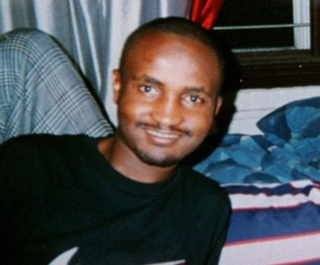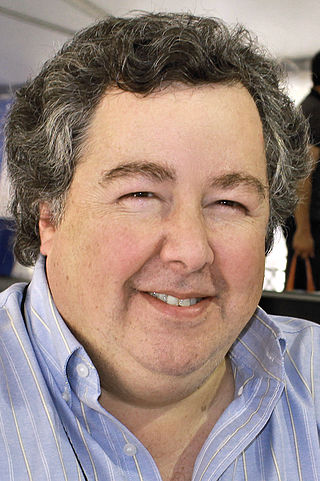
In the early hours of February 4, 1999, an unarmed 23-year-old Guinean student named Amadou Diallo was fired upon with 41 rounds and shot a total of 19 times by four New York City Police Department plainclothes officers: Sean Carroll, Richard Murphy, Edward McMellon, and Kenneth Boss. Carroll later claimed to have mistaken Diallo for a rape suspect from one year earlier.

Sydney Hillel Schanberg was an American journalist who was best known for his coverage of the war in Cambodia. He was the recipient of a Pulitzer Prize, two George Polk awards, two Overseas Press Club awards, and the Sigma Delta Chi prize for distinguished journalism. Schanberg was portrayed by Sam Waterston in the 1984 film The Killing Fields based on the experiences of Schanberg and the Cambodian journalist Dith Pran in Cambodia.
Tawana Vicenia Brawley is an African American woman from New York who gained notoriety in November 1987 at age 15 when she falsely accused four white men of kidnapping and raping her over a four-day period.
Jay Anthony Lukas was an American journalist and author, best known for his 1985 book Common Ground: A Turbulent Decade in the Lives of Three American Families. Common Ground is a classic study of race relations, class conflict, and school busing in Boston, Massachusetts, as seen through the eyes of three families: one upper-middle-class white, one working-class white, and one working-class African-American. He has won two Pulitzer Prizes.
Janet Leslie Cooke is an American former journalist. She received a Pulitzer Prize in 1981 for an article written for The Washington Post. The story was later discovered to have been fabricated and Cooke returned the prize, the only person to date to do so, after admitting she had fabricated stories. The prize was awarded instead to Teresa Carpenter, a nominee who had lost to Cooke.
Richard Read is a freelance reporter based in Seattle, where he was a national reporter and bureau chief for the Los Angeles Times from 2019 to 2021. A two-time Pulitzer Prize winner, he was a senior writer and foreign correspondent for The Oregonian, working for the Portland, Oregon newspaper from 1981 to 1986 and 1989 until 2016.
Gareth Cook is an American journalist and book editor. He was awarded a Pulitzer Prize in 2005 for “explaining, with clarity and humanity, the complex scientific and ethical dimensions of stem cell research.” He is the founder and Editor in Chief of the Verto Literary Group, "an editorial consulting studio that works with authors, agents, and publishers to bring important stories and ideas to life." Cook was a contributing writer for The New York Times Magazine, the series editor of The Best American Infographics and the editor of Mind Matters, Scientific American's neuroscience blog. His writing has appeared in The New York Times Magazine, The Boston Globe, Wired, and Scientific American.

Rick Bragg is an American journalist and writer known for non-fiction books, especially those about his family in Alabama. He won a Pulitzer Prize in 1996 recognizing his work at The New York Times.

Adam Haslett is an American fiction writer and journalist. His debut short story collection, You Are Not a Stranger Here, and his second novel, Imagine Me Gone, were both finalists for both the Pulitzer Prize and the National Book Award. He has been awarded fellowships from the Guggenheim Foundation, the American Academy of Arts and Letters, and the American Academy in Berlin. In 2017, he won the Los Angeles Times Book Prize.
Charles Laurence Strum was an American journalist and author. He worked as a senior editor at The New York Times from 1979 until his retirement in 2014.
Michael G. Taibbi is an American television journalist best known for his work at NBC News.
The Pulitzer Center on Crisis Reporting is an American news media organization established in 2006 that sponsors independent reporting on global issues that other media outlets are less willing or able to undertake on their own. The center's goal is to raise the standard of coverage of international systemic crises and to do so in a way that engages both the broad public and government policy-makers. The organization is based in Washington, D.C.
Robert Dennis McFadden is an American journalist who worked for The New York Times from 1961 to 2024. He won a Pulitzer Prize in 1996.
Dele Olojede is a Nigerian journalist and former foreign editor for Newsday. He is a winner of the Pulitzer Prize for his work covering the aftermath of the Rwandan genocide. He serves on the board of EARTH University, in Costa Rica, and of The Markup, the New York-based investigative journalism organization focused on the impact of large tech platforms and their potential for human manipulation. He is the founder and host of Africa In the World, a hearts and minds festival held annually in Stellenbosch, in the Cape winelands of South Africa. He was a patron of the Etisalat Prize for Literature.

Dan Fagin is an American journalist who specializes in environmental science. He won the 2014 Pulitzer Prize for General Nonfiction for his best-selling book Toms River: A Story of Science and Salvation. Toms River also won the Helen Bernstein Book Award for Excellence in Journalism, the National Academies Communication Award, and the Rachel Carson Environment Book Award of the Society of Environmental Journalists, among other literary prizes.

David Leonhardt is an American journalist and columnist. Since April 30, 2020, he has written the daily "The Morning" newsletter for The New York Times. He also contributes to the paper's Sunday Review section. His column previously appeared weekly in The New York Times. He previously wrote the paper's daily e-mail newsletter, which bore his own name. As of October 2018, he also co-hosted "The Argument", a weekly opinion podcast with Ross Douthat and Michelle Goldberg.
Thomas Zeller Jr. is an American journalist who has covered poverty, technology, energy policy and the environment, among other topics, for a variety of publications, including 12 years on staff as a writer and editor at The New York Times. He has also held staff positions at National Geographic Magazine and The Huffington Post.
Meyer "Mike" Berger was an American journalist, considered one of the finest newspaper reporters. He was also known for "About New York", a long-running column in The New York Times, and for his centennial history of that paper. Since the year after his death, Columbia School of Journalism annually gives the Berger Award to a reporter for outstanding local reporting.
Etheleen Renee Shipp is an American journalist and columnist. As a columnist for the New York Daily News, she was awarded the 1996 Pulitzer Prize for Commentary for "her penetrating columns on race, welfare and other social issues."
Joel Graham Brinkley was an American syndicated columnist. He taught in the journalism program at Stanford University from 2006 until 2013, after a 23-year career with The New York Times. He won the Pulitzer Prize for International Reporting in 1980 and was twice a finalist for a Pulitzer Prize for Investigative Reporting.





